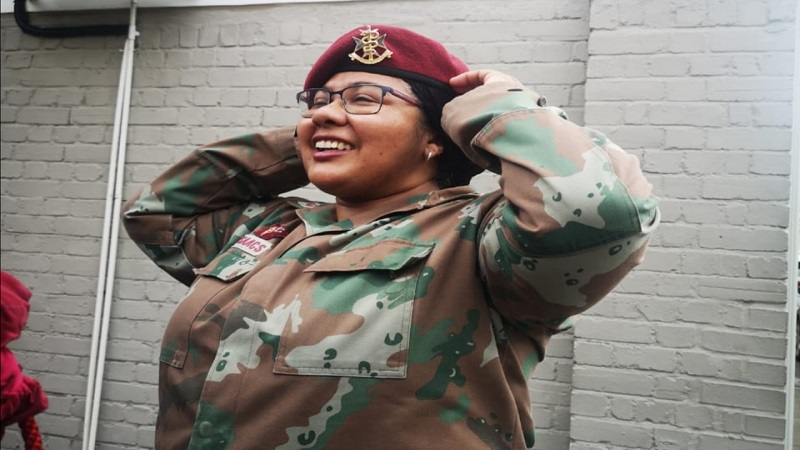by Tauhierah Salie
The legal representatives of South African National Defense Force (SANDF) major Fatima Isaacs will be heading to the Equality Court to challenge the policy which prohibited her from wearing a headscarf with her uniform.
In a historic ruling on Tuesday, the military court withdrew the three disciplinary charges Isaacs faced, after she refused to remove a headscarf worn under her beret last year.
Minister of Defence and Military Veterans Ms Nosiviwe Mapisa-Nqakula welcomed the withdrawal.
When word of the case broke in June 2019, it gained the attention of the international community and raised questions of discrimination and Islamophobia within the SANDF. Isaacs was supported by many, including the Muslim Judicial Council, while the SANDF was criticized for its stance in a democratic South Africa.
A statement by the Legal Resource Centre (LRC) that is representing Isaacs, explained what the charges against Isaacs meant:
“In June 2018, (Isaacs) was instructed that the wearing of the headscarf was contrary to the SANDF Dress Policy Instruction Amendment No 5: Wearing of Religious and Medical Adornments by SANDF Members in Uniform (2002) (Religious Dress Policy).”
“Compliance with the policy would require the removal of her headscarf, which would be against her religious beliefs. Accordingly, when she was ordered to remove the headscarf she was unable to obey the order. She was initially given a final wearing and was subsequently criminally charged with three counts of contravening section 19(1) of the Military Discipline Code: disobeying lawful commands or orders,” read the statement.
The military initially stood firmly behind its decision, noted the strict uniform policy and related regulatory framework.
A month after the charges were brought forward, the SANDF granted interim relief that allow Muslim women to wear an “underscarf” in conformity with the military dress code.
SANDF Chaplain General, Monwabisi Andrew Jamangile, at the time said the SANDF was in the process of finalizing a decision to reshape it’s uniform policy. Isaacs’ disciplinary charges of ‘disobeying a lawful instruction’ remained intact.
The LRC statement went on to explain how it wrote to the director of Military Prosecutions in November 2019, stating that the said charges were unconstitutional as it limited her rights to freedom of religion, equality and dignity.
At the latest court appearance, the presiding Judge heard that the scarf which Isaacs appeared in court with, was not the scarf in question. The military advocate, Colonel Kitano, however used the scarf as a reference to point out that the scarf she currently wore was unacceptable. However, she has been granted permission to wear a scarf in compliance with several specifications.
Isaacs will now be allowed to wear her headscarf on the following conditions that the scarf: is plain black and does not have patterns, does not cover her ears, is tight around her head and is worn at specific times.
Speaking outside the court at the Castle of Goodhope, the LRC’s Amy Leigh Payne noted that Isaacs compliance with the restrictions is not a guarantee that she will not be criminally charged again.
“The problem is that they (the SANDF) withdrew the charges subject to certain restrictions. We are proceeding to the Equality court because the policy currently states that she is not allowed to wear her headdress,” said Payne.
Labour Law expert and member of Isaacs legal team, Nazeema Mohamed, said it is disappointing that the case continues to be dragged out. Mohamed said they are hoping that the outcome of the case sets a precedent that can address religious discrimination.
“There’s a whole string of conditions that is in contradiction with the initial interim relief agreement that we entered into with very senior superior officers, like the general and military commander.”
The representative expressed relief that ‘it does take a little pressure off her’ but emphasised that the number of restrictions attached to the withdrawal of the charges was not a win.
“We are not too happy- we see it as half a victory. We need to put the entire issue of discrimination against Major Fatima Isaacs and other women within the SANDF to rest. We need to expose the problems that the people who are working in the SANDF are experience,” said Mohamed.
Meanwhile, the Muslim Judicial Council (SA) commended Isaacs in her fight for religious freedom. in a statement, the MJC acknowledged those involved and noted that it will be following the case’s developments.
“The MJC as the Religious Advisory Board will continue to pursue the issue of Muslim women wearing the scarf as well as engaging the SANDF and all other government institutions. The MJC wishes to acknowledge the wise counsel of the relevant authorities in the SANDF to resolve the Major Fatima Isaacs case in particular by collaborating to confirm the onderdoekie as part of SANDF Policy as a first step.
“The MJC places on record thanks to the Chaplain General for his support and cooperative stance in representing the SANDF. We also express our appreciation to all those who ably assisted and supported Major Fatima Isaacs during this process,” read the statement.
Meanwhile, the legal counsel emphasised that the battle is far from over.
“We shouldn’t be fooled that the withdrawal is a victory, the victory to us will only in the Equality court and the Constitutional court. The struggle continues,” stated Mohammed.
Mohamed added that the legal team has approached the SANDF about wearing full hijab and noted that the SANDF has been provided with pictures to scrutinize.
VOC






 WhatsApp us
WhatsApp us 

